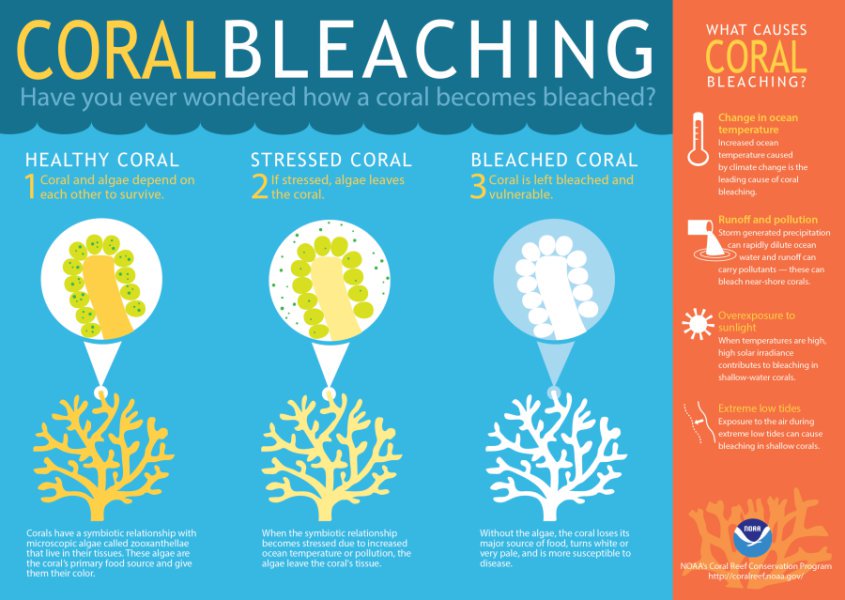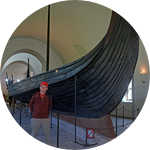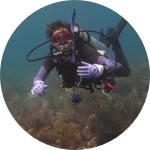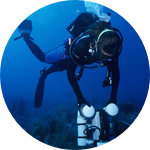About This Project
Sea fans, sea whips, and sea rods, commonly referred to as "gorgonians", are some of the most visually dominant features on coral reefs. Despite their prominence, research has focused on stony coral declines leaving little information about the status and condition of gorgonians. This study will use historical data and modern video technologies to provide a "before and after" picture of gorgonian condition in Biscayne National Park (1977-81 to 2016).
Ask the Scientists
Join The DiscussionWhat is the context of this research?
Biscayne National Park (BNP) is one of the largest national marine parks in the United States and the only one located directly adjacent to a booming urban center (aka: Miami). BNP features nearly 4000 coral reefs and the largest stretch of mangrove forests on Florida’s east coast, which harbor diverse arrays of marine flora and fauna including several commercially important species. When the park was established in 1968, scientists documented luxurious stands of elkhorn corals on outer reefs and diverse populations corals, gorgonians, and sponges on patch reefs. Since then, coral abundance and condition have drastically declined (>40% in many areas). Many reefs once dominated by reef-building corals are now dominated by alternative species assemblages such as gorgonians.
What is the significance of this project?
Gorgonians are an integral part of reefs systems. They provide refuge for a variety of organisms and are an important source of marine pharmacological compounds. However, much of the published data has focused on stony corals leaving gaps in the historical records for gorgonians. Current published gorgonian data are mostly coarse measurements of group cover or density restricted to single-year datasets. Without more detailed historical data, it is unclear how gorgonians have responded to the same stressors impacting stony corals. How have gorgonians in BNP changed since the 70s? Are gorgonian species thriving? Are gorgonian species healthy or showing signs of stress? How do gorgonians respond to stress?
What are the goals of the project?
Historical data paired with contemporary data can be a powerful tool for measuring the health of ecosystems and for detecting change. The primary goals of this study are to determine how gorgonian assemblages have changed at select reef sites in BNP since the late 1970s and explore how accurately gorgonian abundance, percent cover, and health can be measured using new high-resolution digital action cameras. To accomplish this, gorgonian data collected at eight sites in BNP from 1977–81 will be compared to data collected at the same sites in 2016. Between 1977-81 and 2016 numerous perturbations have impacted reefs in BNP including mass bleaching events, disease, major hurricanes, black-water events, and cold-water intrusions (for more info see Lab Notes).
Budget
Funding is needed to assist with the extensive costs associated with conducting underwater field research. We have already purchased the GoPro cameras, scuba gear, and basic field supplies (PVC, underwater paper, measuring tapes, etc) so we have what we need to collect the data.
The real cost is the transportation to the sites and lodging in Miami area while we complete the work which is why we need your help. Field sampling is estimated to take three days (four nights) if the weather permits. Two divers are needed for data collection and a safety spotter top-side on the boat (well...that's to keep us safe!).
While $3900 is the minimum we'd need to do the fieldwork portion of my dissertation, any additional funds over our goal will be put towards data analysis and publishing fees.
(NOTE: The estimate for the boat includes boat rental, fuel, and scuba tank rental.)
Endorsed by
Meet the Team
Affiliates
Selena Johnson
It seems like it was only yesterday that I was standing on the dive platform, clipboard and quadrat in hand, eager to conduct my very first coral reef survey for FWC. At the time (almost 20 years ago), I barely had ten dives under my belt and there I was jumping into fifty feet of water with a ripping current carrying fifty pounds of gear. “Green” doesn't quite do my level of naivety justice. I had no idea how difficult that day in the field would be. I lost my clipboard and nearly floated away to Cuba in the current, but nonetheless that was the day I fell in love with coral reef research. The reefs were the most majestic thing I had ever seen and in that moment I decided to use everything I learned to help protect these valuable resources.
Now I am pursuing a Ph. D. in Biological Oceanography at the University of South Florida College of Marine Science with research focused on none other than...coral reefs! More specifically my research interests are focused around the physiology and ecology of Caribbean gorgonians.
When I am not being a student myself I teach various courses for the university. I also work closely with many public high school teachers to develop inquiry-based science curricula.
Dustin Johnson
After receiving my Bachelors of Science in Biology with a concentration in Marine Science from Eckerd College, I was fortunate enough to secure a job with Florida's Fish and Wildlife Research Institute as a research biologist on the Coral Reef Evaluation and Monitoring Project. I also lead a project on the Assessment of Population and Community Structure of Sessile Macro Invertebrates Following a Benthic Mortality Event int he Easter Gulf of Mexico. After five years I moved into a software development field were much of my database experience came into play.
With over six years of professional experience in research and technology while working with a variety of government and private agencies, I possess advanced computer and technical knowledge but I have never lost my passion for conservation. I have experience managing restoration and monitoring projects in the Gulf of Mexico and Florida Keys as well as conducting natural resource damage assessments related to ship groundings and red tide.
In addition to the Marine Science and Technology skills I also maintain an Assistant Instructor Scuba certification and have served as the Dive Safety Officer for multiple organizations over the years giving me all the needed skills to safely lead field research that is needed for this project.
I have developed a proven track record in creating and implementing efficient processes for managing projects, analyzing data, applying research, and reporting information to create successful projects which I hope to utilized to the fullest on this project.
Additional Information
 "A new NOAA outlook shows that many coral reefs across around the world will likely be exposed to higher-than-normal sea temperatures for an unprecedented third year in a row, leading to increased bleaching - and with no signs of stopping. While the bleaching event is global, it will hit the US hard."--Science News
"A new NOAA outlook shows that many coral reefs across around the world will likely be exposed to higher-than-normal sea temperatures for an unprecedented third year in a row, leading to increased bleaching - and with no signs of stopping. While the bleaching event is global, it will hit the US hard."--Science News
Project Backers
- 11Backers
- 15%Funded
- $549Total Donations
- $49.91Average Donation



